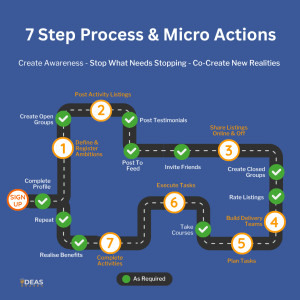The Cost of Looking Away
Ambition & Activity Detail
Why Humanity Must Reclaim Collective Responsibility Now
We are standing on the edge of something vast. The world is shifting—socially, politically, environmentally—and most of us can feel it, even if we can’t name it. The tension in our institutions, the strain in our economies, the fractures in our communities. And yet, day after day, life seems to go on. We scroll, we swipe, we vote occasionally, and we hope the right people will fix things.
But they aren’t. And they won’t.
The truth is this: the systems we’ve entrusted to protect us are no longer capable of delivering the future we need. The cost of disengagement is already evident—in eroded trust, collapsing services, and growing inequality. The bigger danger? We’ve started to accept it. We’re becoming spectators in a game that deeply affects us, and worse, many have stopped believing they can influence its outcome.
It’s time to snap out of it.
This isn’t a manifesto for blame. It’s a reminder that the world only works when we show up. And right now, we’re not showing up where it counts. But we can. And we must. Because the alternative is a future none of us asked for, delivered by systems and people few of us trust.
The Illusion of Participation
For decades, we’ve been sold a minimalist version of democracy. Vote every four or five years. Sign a petition. Maybe show up to a protest if you’re especially passionate. Meanwhile, daily decisions—about money, health, justice, truth—get made without us.
We’ve mistaken visibility for voice. Tweets for change. Outrage for action. And while social media simulates a sense of engagement, it’s largely performative. Likes don’t lead to policy. Comments don’t fix broken laws. Sharing a post doesn’t replace showing up 9but it can now get you jailed).
This illusion has consequences. It fosters apathy. It drains momentum. It turns people into spectators, waiting for others to act. In reality, power never leaves a vacuum. When we step back, someone steps in—usually with an agenda we didn’t vote for.
And while we’re distracted by the next Netflix drop or viral TikTok, the world is being shaped by decisions we’re not a part of. That’s not democracy. That’s dysfunction.
What We’re Ignoring
When we turn away, problems don’t disappear—they fester. Climate change accelerates while we debate slogans. Political corruption spreads while the press chases clicks. Social cohesion crumbles while we shout into echo chambers.
>>> The climate crisis: Reports are dire, but we keep consuming. Policy lags behind science. Hope is shrinking, not because solutions don’t exist—but because action is too fragmented.
>>> Economic inequality: Billionaires multiply, while millions can’t cover basic bills. Workers are more productive than ever, yet many earn less in real terms than decades ago.
>>> Mental health: Isolation, anxiety, and burnout are rampant. Systems built for industrial economies can’t support post-industrial lives. And still, we push harder.
>>> Polarisation: Truth has become relative. Identity politics and algorithmic media have turned citizens against each other. Reasoned debate is replaced with moral panic.
These aren’t abstract issues. They affect how we live, work, raise families, and dream about the future. Yet, most of us engage with them only when the crisis hits home—when it’s already too late.
The great tragedy isn’t that these issues exist. It’s that we’ve accepted we can’t change them. That’s the lie we must dismantle.
Reclaiming Our Power
Responsibility is often misunderstood. It’s not a burden—it’s a key to agency. And agency is what drives change.
Collective responsibility means recognising our interconnectedness. It means admitting that no one person, party, or organisation can fix things alone. But together? We stand a chance.
To reclaim our future, we need:
>>> Clarity: Naming problems clearly. Saying what others won’t. Refusing spin.
>>> Coordination: Working across boundaries. Connecting ambition with action.
>>> Commitment: Realising there is no saviour. It’s on us. All of us.
Progress is messy. But it’s possible when enough people decide to move in the same direction—even if they start from different places.
The Role of Ideas-Shared
This is why Ideas-Shared exists. Not as another platform for opinions, but as infrastructure for action. A digital space where human agency becomes visible—and powerful.
Here, ambition isn’t theoretical. It’s posted, shared, shaped, acted upon.
You don’t need influence. Or budget. Or permission. You need clarity of purpose and the willingness to start.
Ideas-Shared helps:
>>> Make personal, professional, and societal goals visible.
>>> Connect people across roles, regions, and beliefs.
>>> Build coordinated action through a clear 7-step process.
>>> Turn ideas and frustrations into shared missions and delivered outcomes.
This is civic engagement 2.0 — not performative, but practical. Not passive, but participatory. Not polarising, but unifying.
Because while AI might accelerate some problems—and offer tools to help—it cannot replicate the intent, care, or collaboration of real people. That’s where you come in.
A Call to Conscious Participation
The world doesn’t improve by accident. It improves because people care enough to try, risk enough to fail, and believe enough to begin.
We can’t keep waiting for the perfect leader. Or the perfect plan. Or the perfect moment. The truth is, this is the moment. We’re already in it.
And the only way forward is together—thinking, sharing, building, doing. Day by day. Listing by listing. Voice by voice.
Let’s stop asking who’s to blame. Let’s start asking: what can we build together?
This is your invitation. Don’t scroll past.
Supporting Information
Media
Location & Impact Details
Vote To Help Prioritise Activity Listing
You must be logged in to rate.
Contact Details
There are no reviews yet.



